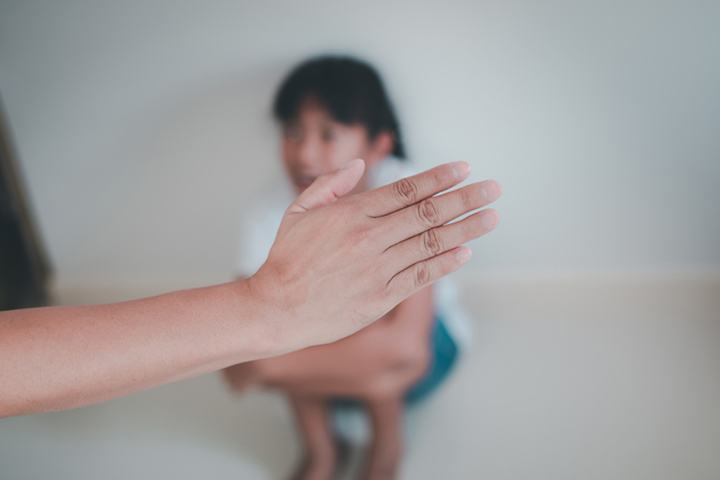
Image: Shutterstock
Parenthood brings about its share of joys and struggles and one major challenge is figuring out the best way to discipline your children. As your child grows, they are bound to pick up on some undesirable behaviors and mannerisms. Most toddlers are prone to throwing tantrums and having fits if they don’t get their way. Sometimes this can get physically aggressive. It’s important to keep in mind that your children may not want to hurt you, they are young and have no idea how to handle strong emotions like anger. Having a full-bodied reaction and hitting you in the process may be their way of venting out this frustration and it is your job as a parent to teach them healthier ways to do just that. Although it can be embarrassing and infuriating to get hit by your child, especially in public, there is no need to feel ashamed. All parents have been there at some point. What matters most is how you deal with this behavior. Let’s go on and read more about the behavior, and a few ways to deal with it.
Why Does Your Child Hit You?
There are numerous reasons why your child resorts to hitting you. Sometimes it’s because they don’t know how to manage their feelings and don’t know how to express them in a socially acceptable way. Sometimes, it’s just a matter of communication. Your child may just lack the language skills and impulse control to keep them in check. Often, it’s the first manipulative tactic they learn. Kids hit without caring about the consequences and want their immediate needs to be met. This means that if you say no, they will hit you to get you to change your mind. Fortunately, they will readily discard this tactic once they realize how useless it is.
What To Do When The Kids Hit you?
1. Teach Appropriate Behavior
Image: Shutterstock
Simply telling your children not to hit you won’t do the trick. You have to teach your kids how to manage their anger. Encourage your kids to engage in an expressive activity when they are angry like drawing a picture, playing with a challenging toy or give them something soothing to do like reading a book or going to their room until they calm down. Teach your children that it is normal to have negative or unpleasant emotions like frustration or anger as long as they learn how to deal with them. Discuss the importance of dealing with their emotions in healthy ways to avoid these physical outbursts.
2. Establish Rules
Create household rules centered around respect. Clearly state that physical acts of violence such as hitting, scratching, biting, and kicking are not allowed. Children take better to following rules if framed positively. For example, instead of writing down “don’t hit,” write down “use respectful touches only.” Talk to them so that you are both on the same page and so they understand the consequences of breaking the rules. Also, let them know that their actions hurt you. For example, if they hit you, let them know that it hurts. Most children don’t want to cause bodily harm to anyone. Keep your message and wording consistent until your child learns that hitting will not be tolerated.
3. Avoid Corporal Punishment
Image: Shutterstock
Reprimanding your child for hitting by hitting them back as a form of punishment will do nothing but confuse them. It makes no sense why they can’t hit you if you hit them. Instead of teaching them self-control and safe ways to release their emotions, hitting them will only make them more aggressive. Children pick up on behaviors and mannerisms through what they observe and mimic and not by what is said to them. So telling them that hitting is bad and then hitting them will not put your message across clearly. The best way to curb aggression is by modeling behaviors that you want your child to exhibit. Show them how to deal with anger, sadness and frustration without lashing out. They will soon follow suit.
4. Use Consequences As A Way To Enforce Rules
You may be wondering how to enforce punishments that garner positive results. Understanding the consequences of their actions is a better way to reach your kids.
1. Time- Out Or Time- In
This method can be very effective on some children. It teaches them how to calm themselves down and removes them from an aggressive environment. Teach them how to regulate their emotions during the calm down period.
2. Restitution
Find a way for your child to make amends. Ask them to perform a chore for you, write a heartfelt apology or draw a picture.
3. Loss Of Privilege
Some children may need additional consequences in order to feel remorse or make changes in their behavior. Taking away or restricting certain privileges can be an effective form of discipline. Taking away their access to electronic devices or their favorite toy for a set amount of time will do the trick.
Parenting and disciplining your little ones can be tricky and challenging. It’s okay to find it hard to tell your children no. But it is important to put your foot down, especially if physical violence is involved. Teaching your children how to deal with emotions at an early age is integral to the kind of adults they will grow up to be. So, what do you do when your child is out of line? Tell us in the comments section.














